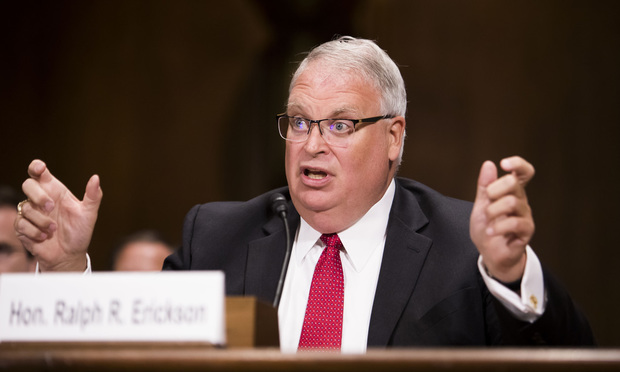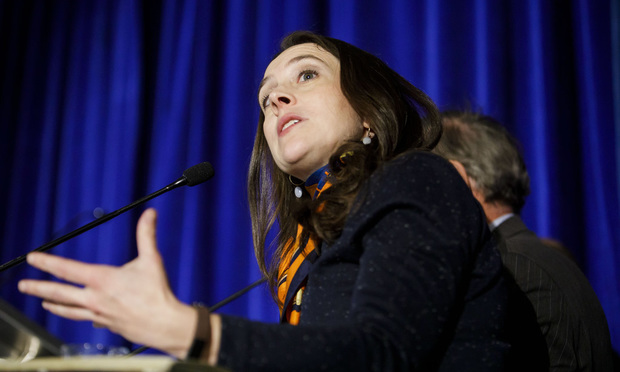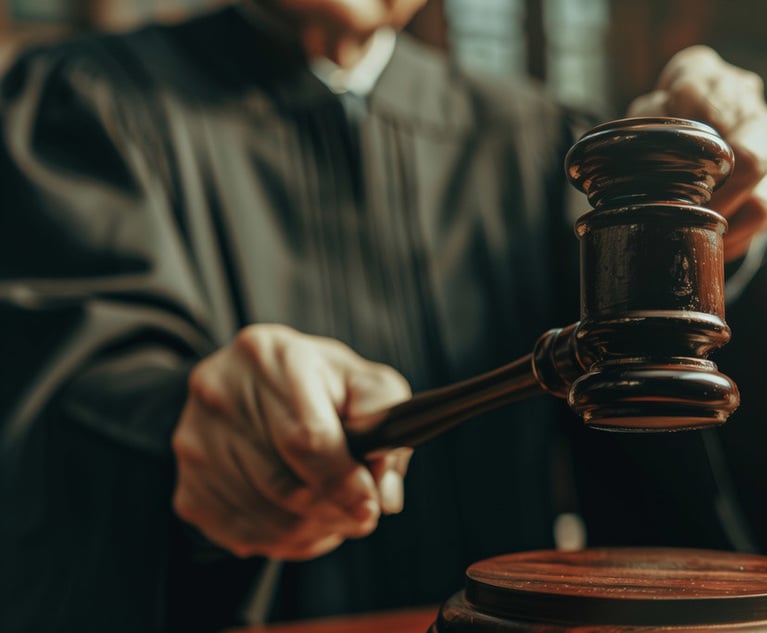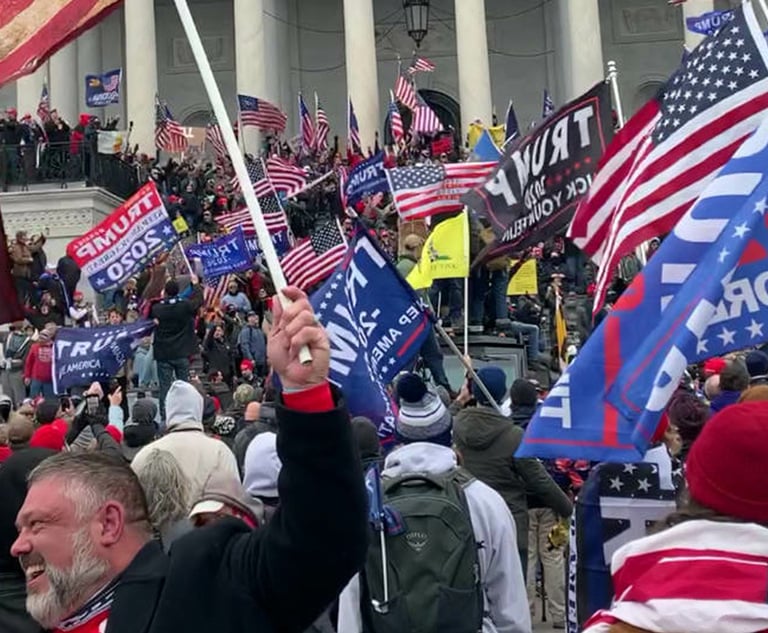No Federalist Society or American Constitution Society Judges? Judiciary Considers Membership Ban
A draft advisory opinion from the Judicial Conference's Committee on Codes of Conduct says federal judges should not be members of the Federalist Society or the American Constitution Society, but belonging to the American Bar Association is fine.
January 23, 2020 at 05:06 PM
8 minute read
The original version of this story was published on National Law Journal
 Ralph Erickson testifies before the Senate Judiciary Committee during his confirmation hearing to be a judge on the U.S. Court of Appeals for the Eighth Circuit on July 25, 2017. Photo: Diego M. Radzinschi/ALM
Ralph Erickson testifies before the Senate Judiciary Committee during his confirmation hearing to be a judge on the U.S. Court of Appeals for the Eighth Circuit on July 25, 2017. Photo: Diego M. Radzinschi/ALM
Federal judges' membership in outside groups are back in the spotlight after a draft advisory opinion said they should not be members of the conservative Federalist Society or the liberal American Constitution Society.
The draft opinion, which began making the rounds on Wednesday, revisits a past finding from the Judicial Conference's Committee on Codes of Conduct that said judges should not hold leadership positions in ACS, but could be a member of the organization.
Calling that past reasoning "flawed," the draft opinion states: "If, as we advised, holding a leadership position in the ACS could reasonably be seen as impairing a judge's impartiality, then membership in the ACS raises the same concerns."
And it finds that membership in the Federalist Society raises similar issues.
"The conclusion we reached 15 years ago, if anything, is more apt today than it was then: affiliation with organizations holding such views 'might reasonably be seen as impairing [a judge's] capacity to decide any issue of constitutional law that may come before [the judge], and might reasonably be seen as [the judge's] indirect advocacy [of the organizations'] policy positions.' This alone warrants the conclusion that membership in the ACS or the Federalist Society is inconsistent with obligations imposed by the Code," the draft reads.
It further highlights the "nature of the factional missions of the ACS and the Federalist Society," stating that a "reasonable and informed public would view judges holding membership in these organizations to hold, advocate, and serve liberal or conservative interests."
"The Federalist Society formed in part to counter the perceived liberal influence of the [American Bar Association], and the ACS then formed to combat the perceived conservative success of the Federalist Society," the draft reads. "The Committee cannot see how the public could perceive the two organizations any differently from how the organizations perceive themselves."
The advisory opinion, in its current form, would not block judges from participating in events held by the organizations.
The draft opinion is not final. It's been circulated to federal judges for their consideration and comments, which will then be considered by the Committee on Codes of Conduct.
Judge Ralph Erickson of the U.S. Court of Appeals for the Eight Circuit, who chairs that committee, said the body will issue advisory opinions on a topic when they receive several questions on it from judges. He said it can take two to three years for some opinions to come out in their final version, but declined to give a timeline for this specific opinion.
He declined to provide details on the process behind this specific draft opinion, citing the typically confidential nature of the committee's work.
The judge said the committee set a May 20 deadline for judges and other members within the federal judiciary to submit their comments, and the group of 15 judges who sit on the panel will then "refine or redraft the opinion" accordingly.
He did express some frustration with the draft becoming public before it could be finalized and released by the Judicial Conference.
"[The draft opinions] have never been released to the broader public for their comments," Erickson said. "Obviously, it's been obtained by various press outlets."
 Carrie Severino, chief counsel and policy director of Judicial Crisis Network, at the Federalist Society National Lawyers Convention held at the Mayflower Hotel in Washington on Nov. 14, 2019. Photo: Diego M. Radzinschi/ALM
Carrie Severino, chief counsel and policy director of Judicial Crisis Network, at the Federalist Society National Lawyers Convention held at the Mayflower Hotel in Washington on Nov. 14, 2019. Photo: Diego M. Radzinschi/ALMThe release of the advisory opinion drew scorn from conservatives almost immediately. Carrie Severino, the chief counsel and policy director of the Judicial Crisis Network, attacked the opinion for its "muddled reasoning," and labeled it "clearly part of the long running political attack on the Federalist Society."
When asked whether judges should be taking steps to prevent even the appearance of impropriety, Severino highlighted the Federalist Society's lack of formal participation in amicus briefs and other forms as advocacy in arguing that the perception is based on a false narrative.
Instead, she said judges should be considered based on personal actions they have taken in the past, rather than being judged based on perceptions of groups to which they belong.
"Maybe if there's a specific action in his or her personal capacity on behalf of a cause or a legal change they're arguing for, that might be cause for concern," Severino said. "Not mere membership in the organization."
The Federalist Society has become a lightning rod for debates over judicial independence, as figures associated with the group have played an outsized role in Trump's reshaping of the federal courts. Chairman Leonard Leo has personally helped Trump with judicial picks, and recently announced a new political group that will also address judicial nominees.
One judicial nominee's affiliation with the Federalist Society was called into question during his nomination hearing before the Senate Judiciary Committee earlier this month, when Sen. Richard Blumenthal noted that Cory Wilson had recently rejoined the group after letting his membership lapse.
But Republican Sen. Mike Lee, who said he has been attending Federalist Society events since he was a teenager, said membership in the organization "is, in no way, shape or form, something that should be the subject of legitimate inquiry."
The other group impacted by the opinion, ACS, is the largest and most influential judicial group on the left. However, it is still viewed as pulling less weight than the Federalist Society—whose reputation and role the group doesn't want, according to its leaders.
"Lots of people in the ACS network would make great judges. And part of what ACS wants to do is to help progressive lawyers across the country who think that they want to be judges understand what you need to do to get to be a judge," Pam Karlan, the chairwoman of ACS's board of directors, said last year. "But I don't view ACS as simply an employment agency."
The draft opinion also addresses membership in the ABA, which has faced recent conservative criticism after the group's standing committee on the federal judiciary gave "not qualified" rankings to nine of Trump's judicial nominees.
The draft states that "it is apparent from the inquiries the Committee has received that many judges have concluded that membership in the ABA is problematic," and points back to the Federalist Society's belief that itself is a counterweight to the ABA.
"Still, the ABA's mission, unlike that of the ACS or the Federalist Society, is concerned with the improvement of the law in general and advocacy for the legal profession as a whole. Any individual policy agenda advanced by the ABA's House of Delegates is ancillary to the ABA's core, neutral, and appropriate Canon 4A objectives," the document reads. "Thus, the ABA is not defined and focused to the point that membership could necessarily be perceived as indirect advocacy for or agreement with its positions on controversial issues."
The issue of judicial independence has come under the microscope during the Trump administration, as the GOP-held Senate has confirmed 187 of the president's judicial nominees and Trump attacks judges over their own affiliations, according to a tracker from the conservative Article III Project.
At the same time, Trump and his White House has regularly attacked judges who rule against him. One such attack from Trump in 2018 on an "Obama judge" prompted a rare public rebuke from Chief Justice John Roberts, who said the judiciary does "not have Obama judges or Trump judges, Bush judges or Clinton judges."
At least one group advocating for judicial transparency, Fix the Court, applauded the draft opinion as a step in the right direction.
"By maintaining formal affiliations in these organizations, judges send the signal that they are active players on one of two ideologically motivated teams," Gabe Roth, the executive director of Fix the Court, said in a statement. "There's nothing wrong with having these two teams, but judges should refrain from putting on either side's uniform and stick to the role of umpire."
This content has been archived. It is available through our partners, LexisNexis® and Bloomberg Law.
To view this content, please continue to their sites.
Not a Lexis Subscriber?
Subscribe Now
Not a Bloomberg Law Subscriber?
Subscribe Now
NOT FOR REPRINT
© 2025 ALM Global, LLC, All Rights Reserved. Request academic re-use from www.copyright.com. All other uses, submit a request to [email protected]. For more information visit Asset & Logo Licensing.
You Might Like
View All

Who Are the Judges Assigned to Challenges to Trump’s Birthright Citizenship Order?

‘Undermines the Rule of Law’: Retired US Judges Condemn Trump’s Jan. 6 Pardons

Longtime AOC Director Glenn Grant to Step Down, Assignment Judge to Take Over
4 minute readTrending Stories
- 1When Words Matter: Mastering Interpretation in Complex Disputes
- 2People in the News—Jan. 28, 2025—Buchanan Ingersoll, Kleinbard
- 3Digital Assets and the ‘Physical Loss’ Dilemma: How the Fourth Circuit’s Ruling on Crypto Theft Stands at Odds With Modern Realities
- 4State's Expert Discovery Rules Need Revision
- 5O'Melveny, White & Case, Skadden Beef Up in Texas With Energy, Real Estate Lateral Partner Hires
Who Got The Work
J. Brugh Lower of Gibbons has entered an appearance for industrial equipment supplier Devco Corporation in a pending trademark infringement lawsuit. The suit, accusing the defendant of selling knock-off Graco products, was filed Dec. 18 in New Jersey District Court by Rivkin Radler on behalf of Graco Inc. and Graco Minnesota. The case, assigned to U.S. District Judge Zahid N. Quraishi, is 3:24-cv-11294, Graco Inc. et al v. Devco Corporation.
Who Got The Work
Rebecca Maller-Stein and Kent A. Yalowitz of Arnold & Porter Kaye Scholer have entered their appearances for Hanaco Venture Capital and its executives, Lior Prosor and David Frankel, in a pending securities lawsuit. The action, filed on Dec. 24 in New York Southern District Court by Zell, Aron & Co. on behalf of Goldeneye Advisors, accuses the defendants of negligently and fraudulently managing the plaintiff's $1 million investment. The case, assigned to U.S. District Judge Vernon S. Broderick, is 1:24-cv-09918, Goldeneye Advisors, LLC v. Hanaco Venture Capital, Ltd. et al.
Who Got The Work
Attorneys from A&O Shearman has stepped in as defense counsel for Toronto-Dominion Bank and other defendants in a pending securities class action. The suit, filed Dec. 11 in New York Southern District Court by Bleichmar Fonti & Auld, accuses the defendants of concealing the bank's 'pervasive' deficiencies in regards to its compliance with the Bank Secrecy Act and the quality of its anti-money laundering controls. The case, assigned to U.S. District Judge Arun Subramanian, is 1:24-cv-09445, Gonzalez v. The Toronto-Dominion Bank et al.
Who Got The Work
Crown Castle International, a Pennsylvania company providing shared communications infrastructure, has turned to Luke D. Wolf of Gordon Rees Scully Mansukhani to fend off a pending breach-of-contract lawsuit. The court action, filed Nov. 25 in Michigan Eastern District Court by Hooper Hathaway PC on behalf of The Town Residences LLC, accuses Crown Castle of failing to transfer approximately $30,000 in utility payments from T-Mobile in breach of a roof-top lease and assignment agreement. The case, assigned to U.S. District Judge Susan K. Declercq, is 2:24-cv-13131, The Town Residences LLC v. T-Mobile US, Inc. et al.
Who Got The Work
Wilfred P. Coronato and Daniel M. Schwartz of McCarter & English have stepped in as defense counsel to Electrolux Home Products Inc. in a pending product liability lawsuit. The court action, filed Nov. 26 in New York Eastern District Court by Poulos Lopiccolo PC and Nagel Rice LLP on behalf of David Stern, alleges that the defendant's refrigerators’ drawers and shelving repeatedly break and fall apart within months after purchase. The case, assigned to U.S. District Judge Joan M. Azrack, is 2:24-cv-08204, Stern v. Electrolux Home Products, Inc.
Featured Firms
Law Offices of Gary Martin Hays & Associates, P.C.
(470) 294-1674
Law Offices of Mark E. Salomone
(857) 444-6468
Smith & Hassler
(713) 739-1250








